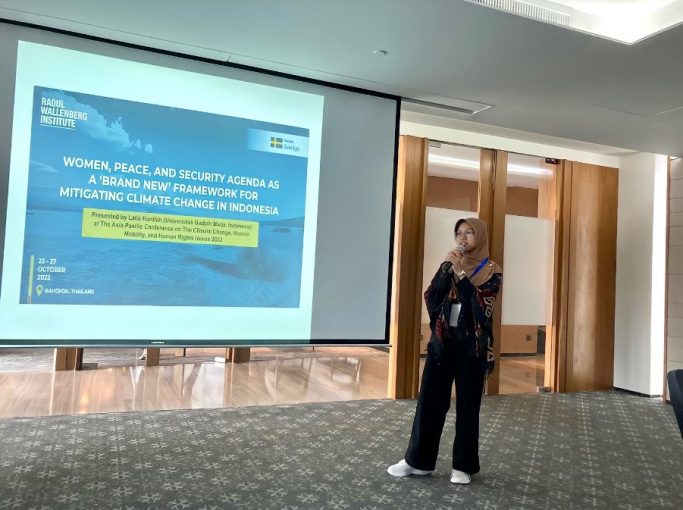
Yogyakarta, November 24th 2022─The student of the Department of International Relations, Laila Hanifah, managed to become a paper presenter at The Asia-Pacific Conference on the Climate Change, Human Mobility, and Human Rights Nexus last October. In a conference held in Bangkok, Thailand, Laila presented her paper entitled “Women, Peace, and Security Agenda as a Brand New Framework for Mitigating Climate Change in Indonesia”.
The conference held by the Raoul Wallenberg Institute aims to become a forum for gathering ideas and ideas from various parties with various backgrounds. Academics, NGOs, until the government gathers to talk about climate change. Laila who has an interest in the world of research feels that there is potential that the study she is interested in can be discussed through the perspective of climate change. “So, I tried to challenge myself to be more courageous to convey ideas scientifically,” Laila said during an interview on Wednesday (11/23).
In compiling his paper, Laila faced many challenges, especially because research from the point of view used by him was still not widely used. Laila had to work hard to look for best practices and empirical evidence. Laila’s paper talks about the climate change mitigation process that must be gender-responsive and involve women’s participation. Laila saw that the organized women’s movement had the potential to become an asset of climate change mitigation in Indonesia. Moreover, women are included in groups that are vulnerable to the impact of climate change.
Laila’s challenge did not stop when the paper was finished. Being a presenter also gave a challenge for Laila, especially when he learned that other presenters were dominated by seniors. “I’m afraid I’m not good enough in front of these seniors,” Laila said. However, Laila actually found warmth and felt well-received by other presenters.
“I feel the atmosphere is warm because I feel I got a new teacher. We learn and appreciate each other,” said Laila. According to Laila, it would be very good if similar activities continue in the future. This can be a forum for the opening of greater opportunities, whether in the form of networking, policy recommendations, or research collaboration which will certainly be very beneficial for our lives.
